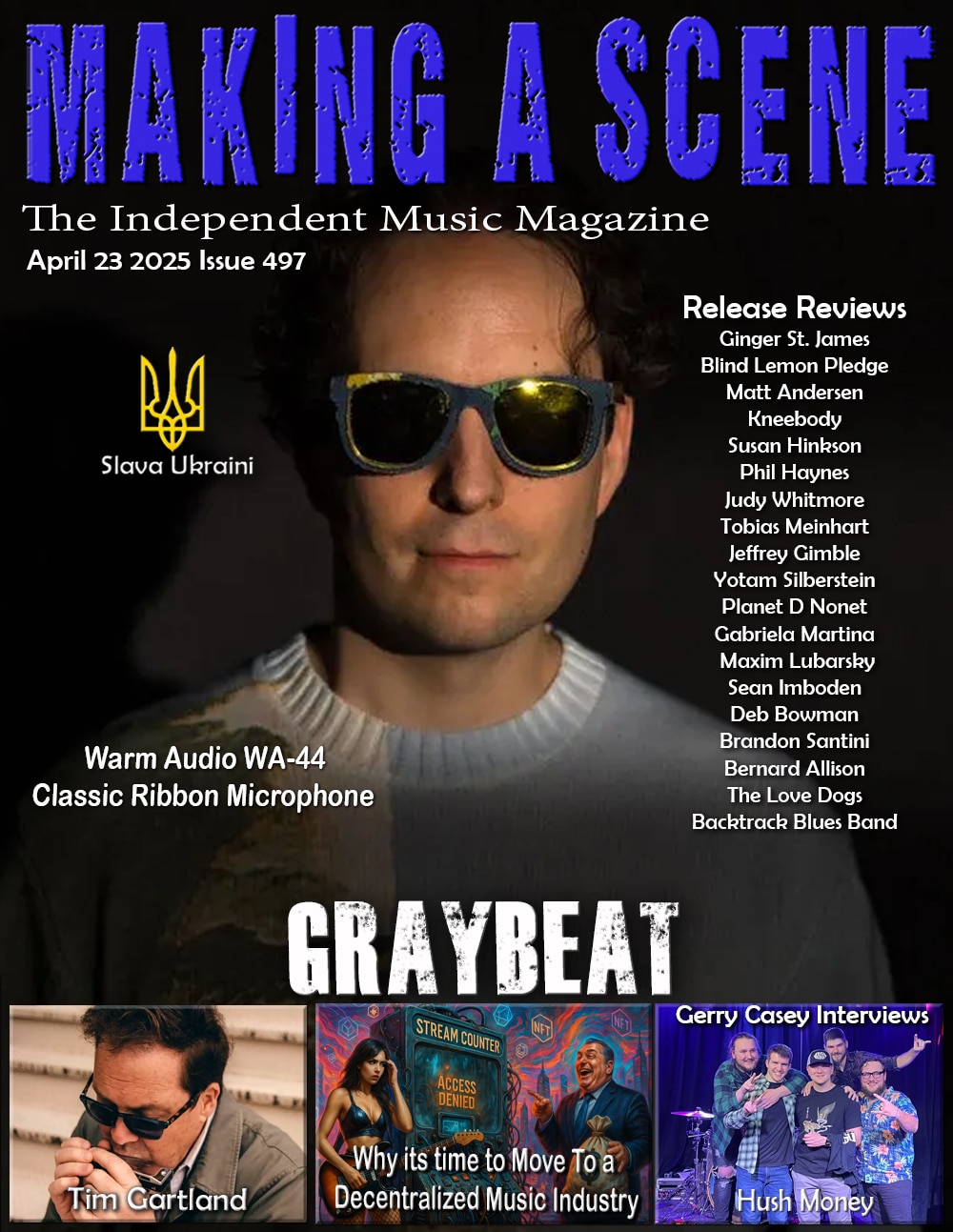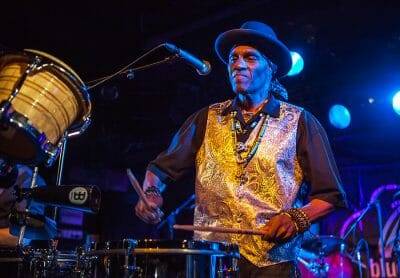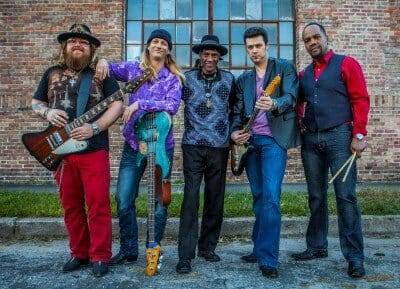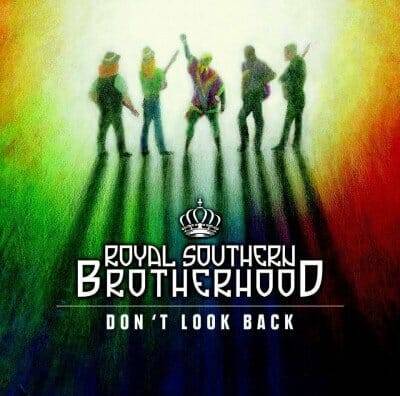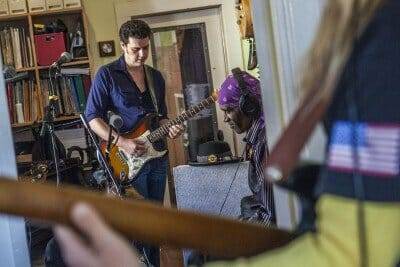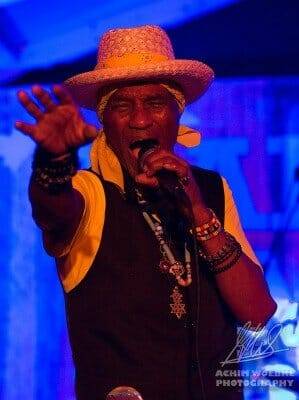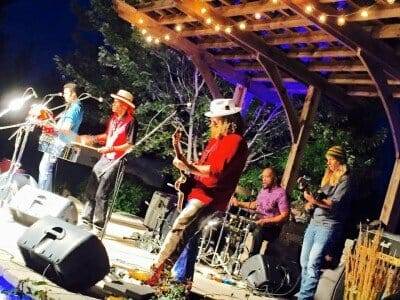An Exclusive Interview with Cyril Neville
An Exclusive interview with Cyril Neville by Richard Lhommedieu on Mixcloud
Don’t Look Back: The Muscle Shoals Sessions
Produced by Tom Hambridge and Blessed by FAME founder Rick Hall
Royal Southern Brotherhood Eyes May 26th For 3rd Studio Album
Atlanta, GA – Ruf Records recording group, Royal Southern Brotherhood (RSB) prepping for the much anticipated release of their third studio album, “Don’t Look Back: The Muscle Shoals Sessions” on May 26th. The album was recorded at the legendary FAME Studio in Muscle Shoals and produced by Grammy award winning producer, Tom Hambridge, along with some new talent has created RSB’s best studio effort to date.
The magic of FAME Studio was not lost on band leader, Cyril Neville. The longtime musical icon almost sounded like a star struck upstart when speaking of the experience, stating, “I stood in the same place (vocal booth) as Wilson Pickett!”
The energy and excitement was not lost on the rest of the band or the music of “Don’t Look Back.” The process began when the band gathered at a rented house along the Tennessee River. The river is famous for the singing-like sounds it makes as the waves lap against the shores. According to the legend of The Singing River; which is associated with the Yuchie tribe, believed the flowing waters sounded like a woman singing. Rueben Williams, a Louisiana native and the band’s manager calls it “tree-verb” when he is down in the state’s bayous and swamps.
The time in the house not only inspired much of the material, it allowed the band to develop the chemistry that separates a band from a group of musicians. For their third effort RSB brought in two new fiery guitar slingers, Bart Walker and Tyrone Vaughan, who have been added to breathe new energy into Royal Southern Brotherhood’s sound. The new blood is there to help the venerable Cyril Neville and powerhouse rhythm section Yonrico Scott and Charlie Wooton up the funk while maintaining the blues and rock edge that has brought Royal Southern Brotherhood a growing, worldwide audience.
The time together showed when the band arrived at FAME. Producer, Tom Hambridge was so mesmerized by the quintet’s cohesiveness he didn’t want to touch a thing but the record button. Songs like “Anchor Me”, “Hell or High Water”, “Baby Girl” and the title track, “Don’t Look Back” all came from various places as the band toured. Whether it was a sound check in the mid-west or a cheap hotel lobby or some studio in Europe, the band fleshed out their ideas (often recorded on their cell phones), so they had structure and hooks worked out before reaching FAME. This allowed the band and Hambridge to concentrate on performance instead of spending time developing ideas.
The band’s two new members, Tyrone Vaughan and Bart Walker fit the band’s new, ‘up the funk’ direction perfectly while bringing their own unique talents to the project.
Bart Walker, who takes original member Mike Zito’s spot on stage left, with his tinted glasses, curly hair and a powerhouse voice. Classically trained, Walker cut his non classical chops with Mike Farris from The Screamin’ Cheetah Willies and keyboardist Reece Wynans (and old SRV bandmate). His 2013 release, Waiting On Daylight, garnered both national and international acclaim. This attention gave Bart the cache to see a lot of the world via Ruf Records President’s, Blues Caravan Tour, which spotlights new talent to sizable audiences. Now a seasoned player, Walker was ready to join the Brotherhood. “Joining RSB was the best idea anyone had for me,” said the affable Walker.
This was Tyrone Vaughan’s only second time collectively playing with the others and he fell into place as if he were a longtime bandmate. Being the son of Jimmie Vaughan and the nephew of the iconic SRV can be a heavy burden to bear. Fortunately, Tyrone is unaffected by the adulation for his family, and developed his own gifted style and signature tone. Tyrone cut his own path by working his way up through the Austin (a town drenched in guitar heroes for the uninitiated) club scene in his teens, eventually packing clubs around Texas. Through hard work, studying the masters and a tip or two from the family, Tyrone has developed a soulful voice along with a guitar tone that mixes blues, rock and country. Tyrone’s description of, “in your face,” tone proves accurate when you hear him cut through any mix.
As for Cyril Neville, once the voice behind the Meters and world famous Neville Brothers, Cyril Neville felt his way his way through the new tunes and members, as his one of a kind soulful energized the recording studio. Although this past year has been filled with many personal and professional events, all he could do was smile at the journey he was to continue, making good music, and sharing it with the world.
This young 65 year old singer has long been considered a New Orleans Icon and musical royalty for his stints in the Grammy Award winning Neville Brothers, Galactic and The Meters. Neville’s career has spawned 45 some odd years and has included performances with music icons such as Bono, Joan Baez, Dr. John and Tab Benoit. In 1989, Cyril penned, “Sister Rosa,” about the Civil Rights icon, Rosa Parks. USA Today honored Neville by choosing the song as one of the most inspirational song about Martin Luther King’s, “I Have A Dream,” speech on the 50th anniversary of the historical oration given during the march on Washington (Parks was in attendance). “Sister Rosa” may not have had a change on the movement at the time, but Neville’s composition reminded a country of the thousands of souls that risked their lives to bring an end to a shameful tradition in the US.
This past year, Cyril found himself being interviewed by another drummer, Dave Grohl, of the Foo Fighters, for the “Sonic Highways” documentary on HBO. This eight-part series that followed the Foo Fighters around to various US cities, capturing the music scene and history that is unique to that city. Grohl, who directed the series, interviewed other Nawlins luminaries Dr. John, Allen Toussaint and Troy “Trombone Shorty” Andrews to gain an understanding of the Crescent City’s unique musical sound.
Cyril Neville’s experience and talent, combined with these energetic players creates a new sound that remains reverent to the blues traditions. Don’t Look Back: The Muscle Shoals Sessions highlights the magic that happens when great songs are performed by great bands. Look for this gem to be available May 26.
2011
Before they even hit a chord, ROYAL SOUTHERN BROTHERHOOD have your attention. In the US South, where music is religion, two rock ‘n’ roll bloodlines tower above all others. In the saloon bars from Mississippi to Maryland, mere mention of the Allman and Neville Brothers casts a magic spell. Conversation falls silent. Pool balls stop rolling. Ten-gallon hats are tipped in respect and beer-bottles raised in salute. These aren’t just bands, they’re gods, and with a lineup comprising both the iconic Cyril Neville and Devon Allman, Royal Southern Brotherhood come pre-loaded with expectations. Don’t worry: they can match them. The family tree might be auspicious, but this new band trades on talent, not genealogy. It’s not about rock history: it’s about the here-and-now. Right now, the buzz is all about Royal Southern Brotherhood’s debut album, bottled with producer Jim Gaines in Louisiana. But let’s rewind to the summer of 2010 and the stifling heat of New Orleans: the city that both hosted the Allmans’ early residence as house band at The Warehouse, and provided the backdrop to the pivotal meeting between Cyril, Devon and Mike Zito. Talk turned to forming a new breed of blues-rock band, and when jams began at a secluded studio in the city’s Garden District, the fizzing chemistry was too strong to deny.
A fistful of demos hinted at the project’s potential, and the web buzzed as a volley of teaser videos hit YouTube, but Royal Southern Brotherhood truly arrived when they broke cover in the flesh at their debut show at New Orleans’ Rock ‘N’ Bowl last September. This was southern rock, but not as we knew it, as tumbling three-part harmonies and hickory-smoked guitar riffs weaved together both families’ styles with added rocket-fuel. The crowd reaction said it all: Royal Southern Brotherhood had crashed the rock scene like a wrecking ball.
This lineup has talent to burn. You’ll already know Cyril Neville: poet, philosopher, percussion master and perhaps the South’s last great soul singer. At 63, this is the latest chapter in a career that began with 1970’s debut solo single, Gossip, and his touchdown in the lineup of older brother Art’s funk outfit, The Meters, who had already hit big with 1969’s immortal Cissy Strut. Cyril lent percussion and vocals to classic albums including 1972’s Cabbage Alley and 1975’s Fire On The Bayou, and when über-fan Mick Jagger invited The Meters to open the Rolling Stones’ stadium tour of 1975, he suggested Cyril took vocals (they agreed).
Post-Meters, he’s been key to the rise of The Neville Brothers, created alchemy with Bob Dylan, Bono and Willie Nelson, toured with funk act Galactic, led his solo band Tribe 13, and made TV appearances on Jimmy Kimmel Live! and HBO’s Treme. It’s one hell of a CV… but he’s only just getting started.
Likewise Devon Allman. As the son of Gregg Allman, the 36-year-old has rock ‘n’ roll in his DNA, but he’s always walked his own path. Growing up apart from his father in St Louis, MO, and refusing to trade on his celebrity surname, Devon’s formative influences took in everyone from The Beatles to KISS, while his early bands ran the musical gamut rather than echo the Allmans. In 1999, he hit the radar as leader of Honeytribe, whose fearless albums announced him as a next-generation guitar hero, but by his thirties, the pull of his Southern heritage couldn’t be denied, and he willingly fell into the soul-drenched blues-rock style that recalls his key influences, Carlos Santana and his uncle Duane Allman, while making his own mark.
In the last seven years, Devon has plotted an old-school ascent, crossing 14 countries on tour, blowing the roof off a new venue each night, and watching as fans and heroes alike fall under his spell. There’s been a Top 10 hit in Spain with Javier Vargas, albums alongside Jack Bruce, jam sessions with heavyweights like Les Paul and Billy Gibbons, even the launch of his own signature amp with Fuchs Audio Technology. When Devon takes the stage – either with Honeytribe or during cameos with his father and the Allmans – fans are wowed by a guitarist who can be smooth, savage or seismic, but it’s in Royal Southern Brotherhood that you’ll hear this modern master playing at full-throttle. Not many guitarists could stand toe-to-toe with him. Step up Bart Walker, who replaced Mike Zito in Fall, 2014: As if it weren’t enough to win the 2012 International Blues Challenge’s prestigious Best Guitarist award and to log thousands upon thousands of miles touring with his own outfit The Bart Walker Band and to be able to provide enough firepower to ignite any town he blows into, Walker now challenges himself even further by taking over as co-lead guitar player with Allman – one of the most coveted spots in one of the most sought-after lineups touring today.
But like Cyril says, it’s all about making “a good gumbo”, and that’s where God’s own rhythm section comes in. Giving Royal Southern Brotherhood its hip-shaking groove are bassist Charlie Wooton and drummer Yonrico Scott: both heavyweight names in their own right, with Charlie’s bass chops celebrated on the Southern jam scene for his sets with the Woods Brothers, and Yonrico hitting the skins for luminaries including the Derek Trucks Band, Gregg Allman and the Allman Brothers themselves. When these five stellar musicians come together as Royal Southern Brotherhood, the planets align.
They said that rock ‘n’ roll was dead, but they were wrong. Right now, in 2014, there’s something in the air, as Royal Southern Brotherhood drag their thrilling new brand of blues-rock and white-hot musicianship from the Southern States onto the world stage.
The South is rising again. Come along for the ride
Discover more from Making A Scene!
Subscribe to get the latest posts sent to your email.





































